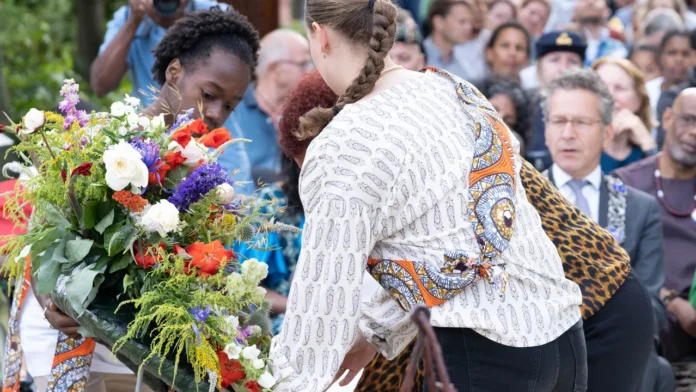It is one hundred and sixty years ago that slavery was abolished in Suriname and the Netherlands Antilles. On Friday evening, this was the focus in the city centre of Eindhoven. The commemoration not only reflected on the past, but also looked to the future. “Let’s create a better world where the wounds of slavery can be healed.”
On July 1, 1863, slavery came to an end in Suriname and the Netherlands Antilles. This was preceded by a period of hundreds of years in which people were shipped by the Netherlands from Africa to Suriname and the Caribbean islands under appalling conditions.
During that crossing, a large number of enslaved people died, while the survivors were forced to work for slave owners. “A painful chapter in our history,” says Saïda Vianen during her speech. “They were branded commodities, dehumanised and reduced to nothing more than property.”
As chairman of the Committee 30 June-1 July Eindhoven, she tries to create awareness about the slavery past. A period that still reverberates among the more than 15,500 Eindhoven descendants of enslaved people from Suriname, Curaçao, Aruba, Bonaire, Sint Eustatius, Sint Maarten, Saba and other countries form the African diaspora.
Dislocated
“Do we realise how this inhumane treatment has disrupted family lines, culture, but also rituals?”, says Saïda Vianen about the consequences of slavery. “We must learn from the past and commit to a fairer future, in which people are respected and treated equally, regardless of their skin colour or origin.”
Mayor Jeroen Dijsselbloem was also present at the commemoration. During his speech he caled on listeners not to be silent about the slavery past.
“Populations have suffered, they have felt despair and humiliation. Some descendants still feel that humiliation and despair. And the pain those people feel is not imaginary. It is actual grief. You don’t brush away those traumas by being silent about it.”
Source : Studio040
Translated by: Shanthi Ramani
















